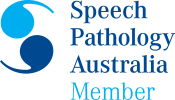From time to time, I come across parents of children that have shopped around to different speech pathologists after finding that their child does not seem to be making progress with their communication or feeding concerns. There are many reasons why this may be the case and even times where progress has been made however not perceived. There are a few things to keep in mind when gauging progress in speech therapy and finding the right treatment for your child.
1. Am I clear on the speech therapy goals set out for my child and were they chosen in conjunction with my concerns and what my child requires most?
Some parents enter into an assessment session with a clear picture of what their child requires, only to be told the issue is something completely different. At times, this may truly be the case if there is an underlying issue that is causing the concern you came in to address in the first place. Other times your speech pathologist may have noticed, a concern unrelated to the initial one, however it may be a more pressing matter or more time sensitive. One example would be if your preschool aged child has speech issues, however your speech pathologist diagnoses a stutter.
While the speech may be your main concern, you speech pathologist will most likely advise you of how time critical it is to treat the child’s stuttering while they are at an age where they are most receptive to effective treatment programs. Having said this, as a parent, you have the final say when deciding what treatment your child obtains and just like with any other health service, it is up to you to make an informed decision as to how best to support your child. We are after all here to help by providing the most up to date and relevant information to help you in making an informed choice.
If you are not satisfied with the therapy goals selected then you may feel the service is irrelevant and not continue. So ensure that you clearly understand the therapy goals and how to measure success in reaching those targets. This can be done through reassessment with your speech pathologist or daily measures of your child’s communication or feeding ability.
2. Is the treatment evidence based and am I following the correct procedure as outlined by my speech pathologist?
Speech pathology is an active therapy and just like other forms of medical treatment, it needs to be provided in the correct dose and have an adequate level of evidence to support its effectiveness. Your speech pathologist should provide you with information about the treatment you or your child is undertaking, how often and how long it should be performed.
Many parents give up on speech therapy before properly administering the techniques. Just like a tablet, if you don’t take it every day then it will not be effective. Many speech treatments require daily practice as outlined by the research behind it, so make sure to give it a proper go before calling it quits and you should see great results.
Contact us for results focused speech therapy
This article was written by our Speech Pathologist Ashleigh Fattah who is a Speech Pathology Australia member. If you have questions about language activities, make an appointment. We‘ll provide you with simple and effective therapy targeted to your concerns. Contact us today.
The post How to Make Speech Therapy Effective appeared first on ENT Wellbeing Sydney.










